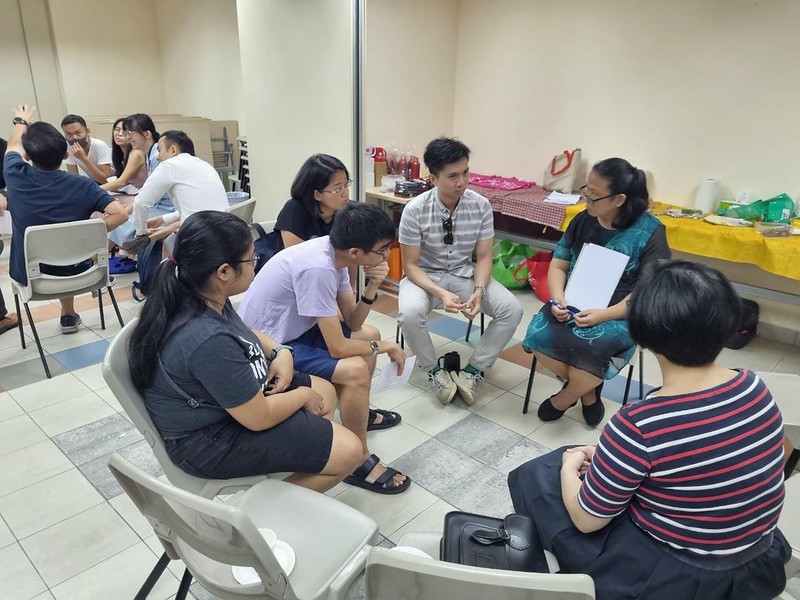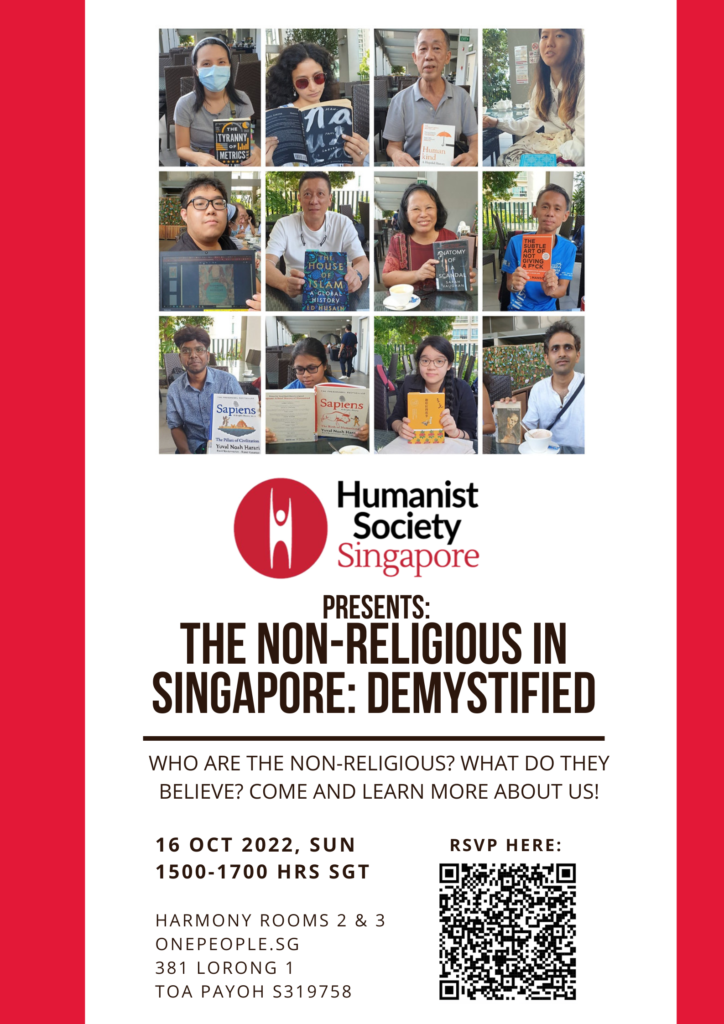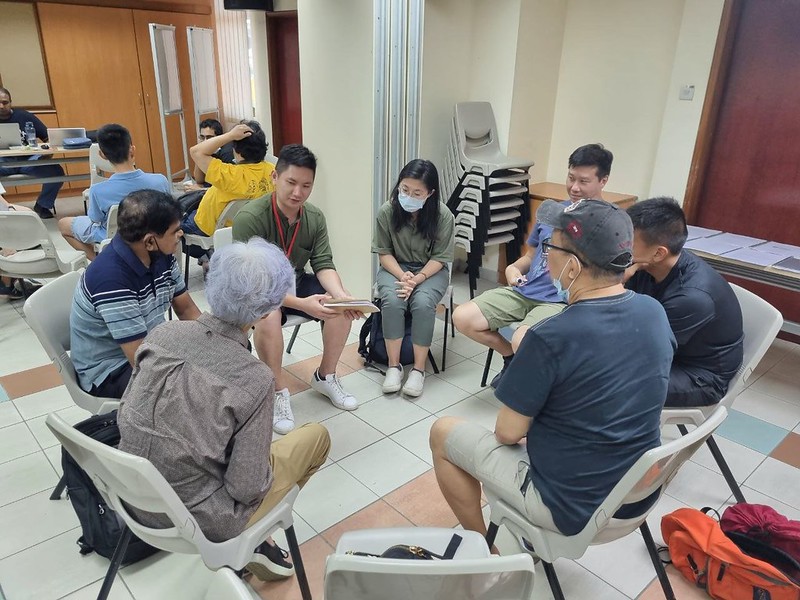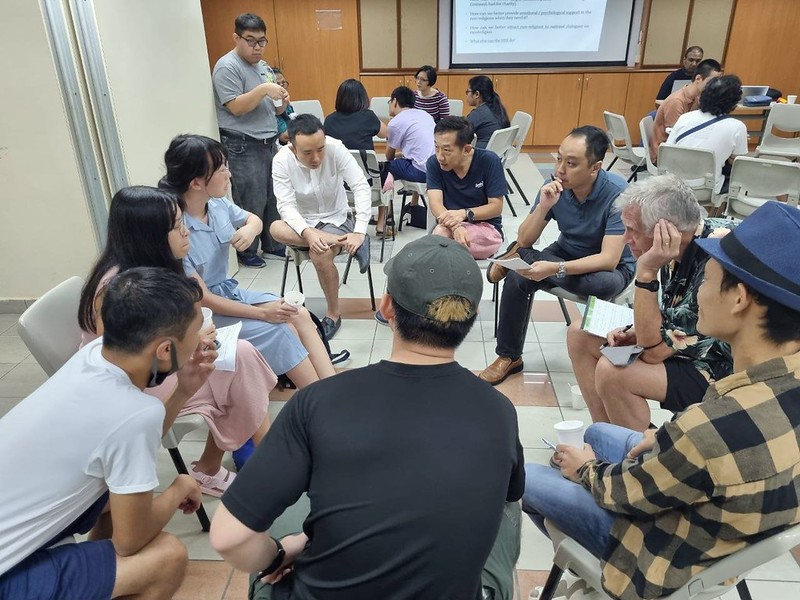
One in five Singaporeans are non-religious. However, public understanding of this demographic is still quite poor.
Fortunately, there has been considerable research done on the non-religious in Singapore over the past decade. The research material came primarily from the IPS and several final-year student projects. Over a few months, the Humanist Society slowly accumulated the best in a new research portal, in an effort to provide a more accurate picture of this group.
On 16 October 2022, as part of the Society’s 12th anniversary, we gave a presentation on the findings and explored explore the following questions:
1) What is the exact composition of the non-religious in SG?
2) What are their views on key national issues?
3) What misconceptions / problems do they face?
4) How can the Humanist Society better serve the non-religious?

Over two hours of discussion, the following emerged:
The big picture
(For detailed info, read the quantitative and qualitative info we compiled)
- The proportion of non-religious people across the country is rising. In general, a higher percentage of youth are non-religious, rising as high as 26.3% for those aged 30-34. However, this trend is reversing for those under age 25 and this is likely due to lower birth rate of the non-religious.
- The commonly-held view that men tend to be non-religious, is exaggerated. The gap between men and women is slight – 51.41% male, 48.58% female.
- About 7 in 10 non-religious residents (499,331) are born in Singapore. Among the foreign-born residents, the largest group are born in Mainland China, making up almost 100,000 individuals. This is followed by Malaysia-born (61,291) and those born in Europe (5,611).
- Misconceptions of the non-religious exist. They fall into two broad categories 1) non-religious are “still religious” and 2) non-religious are less moral/charitable. There’s also concerns of impact on family cohesion, mental health, and “loss of soul” in the country. These concerns are debatable and possibly misplaced.

- While some non-religious are still religious/spiritual, two thirds of non-religious are genuinely non-religious and lack supernatural beliefs. This “core group” should be acknowledged and not dismissed as “still religious.”
- Non-religious views on key national issues (secularism, freedom of speech, govt in leading change, LGBT issues) are actually broadly similar to the rest of the country, although there is a liberal slant in LGBT issues.
- Individuals leave religion for many reasons, a combination of rational and emotional reasons. For the non-religious, having a “greater meaning of life” is a major reason for leaving faith compared to persuasion by friends/family.
- Rational reasons for leaving faith include:
- Skepticism toward unverifiable assertions
- Lack of personal experiences with spirituality to back up religious assertions
- Contradictions against scientific truth
- Unsatisfactory answers from religious leaders
- Emotional reasons for leaving faith include:
- Lack of sense of community
- Misalignment with personal values & identity (ie. Religious views vs homosexuality)
- Misalignment with personal morals & ethics (ie. Religious views on intolerance, gender inequality, concepts of eternal punishment, otherism & tribalism)
- Atheists are not seen as threatening by the public. Only 5% said that they find atheists threatening.
- Nonetheless, on leaving faith, ex-Muslim Malays meet with the most obstacles and it ranges from the legal/social/emotional. Islam is tied to the Malay identity and any act of leaving Islam is seen as leaving the community.
- The non-religious have differing views on how to approach religion. The non-religious disagree on the 1) extent to which they practice traditions, what is worth preserving 2) expectations of the non-religious community to be more outspoken or to be more conciliary.

Gaps in info
The following are gaps of info where more research is needed.
- Morality of the non-religious – There is limited research on whether non-religious are more prone to doing “bad things” / committing crime / giving less to charity.
- No guide on forming a supporting environment for faith leavers having a hard time.
- Limited info on mental health of those leaving religion.
- Majority of literature focused on those leaving Christianity and Islam, but limited info on those leaving other faiths.

How can the Humanist Society better serve the non-religious?
The event broke up into four focus-group discussions where we discussed how the Humanist Society can better serve the non-religious and dispel public misconceptions. The following ideas were brought up.
In general
- Collect and share personal stories from people who can be role models / champions
- Avoid confrontational approaches. Focus on common ground with the religious – “The good things you believe, we believe the same.”
- More events in the calendar to increase face-time and networking. Many people join religion for the community. They are looking for the same with a non-religious alternative.
- Invest in a long-term community project
- Create a programme with a certificate that people can work hard to obtain
Publicity methods
- Invest in good SEO
- Attend more external events, including government / interfaith / civil society events, especially more interactive ones
- Invest in new social media platforms, such as Tiktok and Discord
- Donate to a organization who publicly displays it’s donors
Support systems
- Provide a list of therapists who are more open to faith leavers needing emotional support
- Having a hotline for those in distress
- Continue the existing peer support programmes
- Work towards having a permanent location
Organisational identity
Some participants said that as an organisation, HSS needs to build a core identity and focus on what we really stand for, but do it in a way that does not turn away certain people. The activities that are “good to have” but are resource-intensive and not critical to building a HSS core identity, should be assessed and deprioritised.




